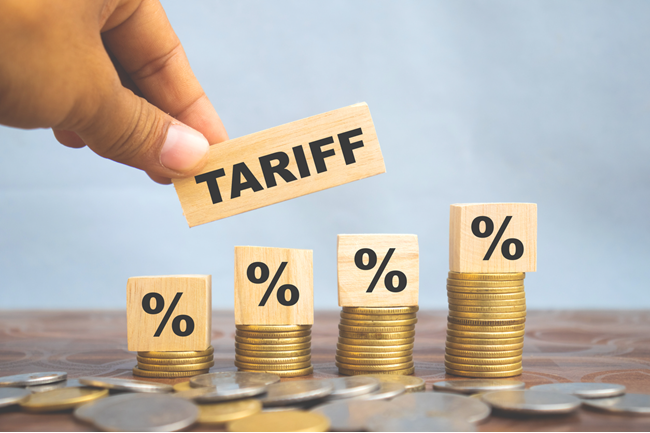The bottom line impact of tariffs on residential landlords is that it inflates costs of repairs and renovations and disrupts the supply chain we need for critical products. Here are 5 things landlords can do.
By Scot Aubrey
With all the talk about tariff–taxes imposed on imported goods–the general public tends to only imagine the impact they will have on manufacturing, trade, or retail.
But for residential landlords like us who own and manage rental properties, tariffs can have surprisingly significant consequences. From rising maintenance costs to inflationary pressures that influence rent dynamics, tariffs affect more than just international commerce; they impact our bottom line.
Repairs and Renovations will Get More Expensive
One of the most direct ways tariffs hit residential landlords is through increased costs of materials.
Many of the everyday items we use to maintain and upgrade our properties are imported; everything from light fixtures and appliances to flooring, plumbing parts, and even drywall. Prices rise with tariffs on these imported goods, which increases the cost of maintaining or renovating our rental units.
If you think about the items that we replace most often, they are likely made of steel and aluminum, which make replacement appliances, HVAC systems, and water heaters more expensive. Tariffs on lumber affect the price of framing, fencing, and decking. Even seemingly minor upgrades like cabinet hardware or lighting fixtures will become pricier if tariffs are in play.
If you manage more than one property, tariffs have the potential to create a financial squeeze you hadn’t planned on when you purchased the property.
Routine repairs become more expensive, and larger renovations—like kitchen remodels or roof replacements—require more capital. If you are operating on tight margins, these increased costs may delay necessary work or force you to make lower-quality choices that could affect property value or tenant satisfaction.
Tariffs Can Disrupt the Supply Chain
Key replacement parts and materials may become harder to source due to trade restrictions or backlogs.
With that, repair timelines stretch out, meaning you could be waiting on a critical component that without, your property is uninhabitable. The inability to place a tenant in the property can also place undue financial pressure on a landlord.
Extended vacancy means lost rental income—and in competitive markets, not having a unit ready in time can mean missing the seasonal peak in tenant demand. Landlords who rely on quick turnovers or who manage short-term rentals may be hit especially hard. It may be advisable to stock up on those items that fail more often to ensure your property is in good repair and ready for the next tenant.
Can You Pass the Additional Costs On?
In theory, landlords could offset rising costs by increasing rent.
In practice, it’s not always that simple.
For many of us, local market conditions play a huge role in rent flexibility. In high-demand markets with limited housing supply, it might be possible to raise rent to match cost increases. But in more balanced or competitive markets, raising rents could result in tenants leaving, leading to turnover costs and potential vacancies.
And if you happen to own rental properties in cities with rent control or rent-stabilization laws, they will cap how much a landlord can increase rent year-over-year. If you are a landlord in one of these areas, rising expenses from tariffs may not be recoverable through rent at all.
Time to Be Strategic- 5 Things Landlords Can Do
What can you as a landlord do to help offset or protect your investments against the economic pressures that tariffs introduce?
- Source domestically where possible: While not always cheaper, buying American-made products can help avoid tariff-related costs and lead times. Local sourcing also supports domestic businesses and may improve quality control.
- Plan renovations carefully: Scheduling upgrades during off-peak seasons, or opting for materials with more stable supply chains, can help avoid costly delays and price spikes.
- Budget with more cushion: With costs possibly fluctuating more due to tariffs, landlords may need to increase reserve funds to cover surprise repairs or longer renovation timelines.
- Lock in long-term contracts: For services such as lawn care, pest control, or routine maintenance, longer-term agreements can help keep costs predictable even if broader inflation rises.
- Consider energy-efficiency upgrades: Tariffs may increase the upfront cost of certain appliances or systems, but energy-efficient investments can reduce long-term operating costs and appeal to tenants who care about sustainability.
The Bottom-Line Impact of Tariffs on Residential Landlords
The impact of tariffs won’t be felt just by big business; they will filter all the way down to everyday residential landlords.
Rising costs, delays, and broader economic shifts can make managing a rental property more expensive and complicated.
By staying informed and adjusting strategies accordingly, landlords can protect their investments, maintain healthy tenant relationships, and keep operations smooth—even as the trade winds change.
Being proactive, flexible, and budget-conscious has never been more important for rental property success.
About the author:
Scot Aubrey is vice-president of Rent Perfect, a private investigator, and a fellow landlord who manages short-term rentals. Subscribe to his weekly Rent Perfect podcast to stay up to date on the latest industry news and for expert tips on how to manage your properties.





